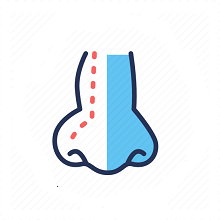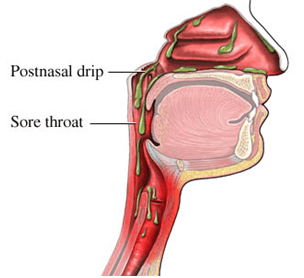Post nasal drip is an unscientific term that refers to the sensation of thick phlegm in the throat, which can become infected. It is annoying because normally the throat is moistened by the nasal secretions and throat mucous glands. When the amount of liquid secreted by the nose and sinus is reduced, and the cilia of the nose and sinus slow down, the fluid thickens and you become aware of its presence. Since the thick phlegm is unpleasant and often infected because it is “just laying there” and not moving, our bodies naturally try to get rid of it, to the annoyance of our partners. Whether caused by pollution, chemical exposure, or severe infection, the treatment requires that the cilia mucous system be brought back to normal.
Excess mucus settles and irritates the nasal and throat lining causing the following:
-Sore throat
-Bad breath(halitosis)
-Cough
What are the causes of Post Nasal Drip?
- Inhaled Irritants- This causes a swelling of the nasal and sinus linings which is very common where there is a lot of smog, dust and smoke.
- Food Allergies – These cause mucus to thicken and cause bad drainage.
- Illnesses – Colds, Flu, Bronchitis, Ear Infections and Tonsillitis are the main causes of PND and the production of excess mucus.
What are the symptoms of Post-Nasal Drip (PND)?
- Clearing your throat all the time – This is the most common symptom of PND. The mucus drains from your sinuses and collect at the top of the throat area.
- Constantly swallowing – This is due to the excess mucus caused by PND
Effective Natural Treatment
Moisturize and clean your nose frequently, right away when you are exposed to fumes, smoke, or dust. A good sinus moisturizer can be used as often as desired. Whatever helps to move the cilia helps post nasal drip. Pulsatile Nasal Irrigation performed daily for 2 weeks is often sufficient because the pulsation encourages good ciliary movement. Stagnant mucus is also removed along with bacteria. Often the key is to simply drink enough water to liquefy the secretions. Ice drinks slow the cilia, and so do most antihistamines. Sometimes patients are taking a large number of various medications and these combine to make the nose dry. Here, pulsatile irrigation is probably the best treatment.


